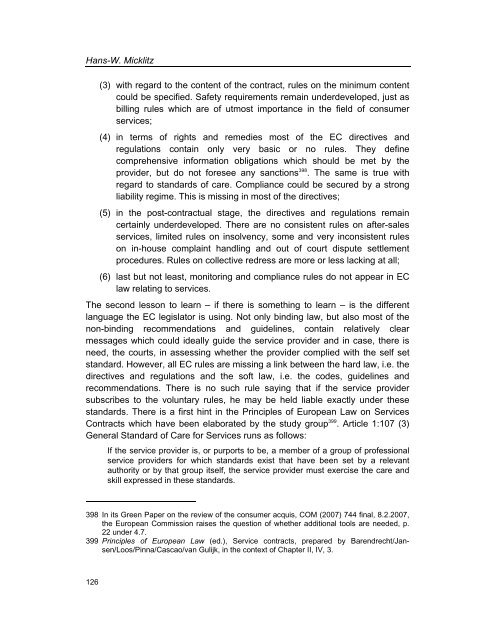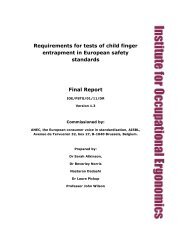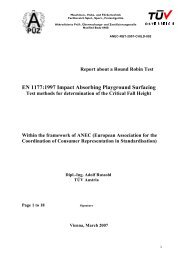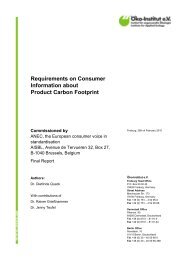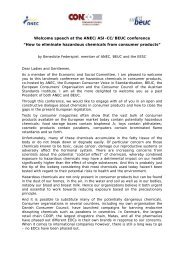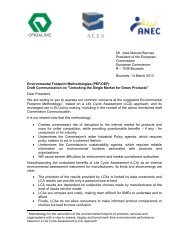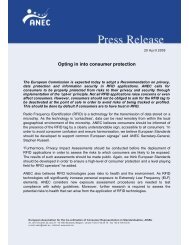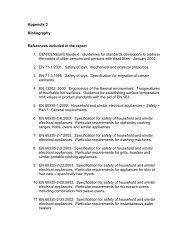Services Standards: Defining the Core Consumer Elements ... - ANEC
Services Standards: Defining the Core Consumer Elements ... - ANEC
Services Standards: Defining the Core Consumer Elements ... - ANEC
Create successful ePaper yourself
Turn your PDF publications into a flip-book with our unique Google optimized e-Paper software.
Hans-W. Micklitz<br />
(3) with regard to <strong>the</strong> content of <strong>the</strong> contract, rules on <strong>the</strong> minimum content<br />
could be specified. Safety requirements remain underdeveloped, just as<br />
billing rules which are of utmost importance in <strong>the</strong> field of consumer<br />
services;<br />
(4) in terms of rights and remedies most of <strong>the</strong> EC directives and<br />
regulations contain only very basic or no rules. They define<br />
comprehensive information obligations which should be met by <strong>the</strong><br />
provider, but do not foresee any sanctions 398 . The same is true with<br />
regard to standards of care. Compliance could be secured by a strong<br />
liability regime. This is missing in most of <strong>the</strong> directives;<br />
(5) in <strong>the</strong> post-contractual stage, <strong>the</strong> directives and regulations remain<br />
certainly underdeveloped. There are no consistent rules on after-sales<br />
services, limited rules on insolvency, some and very inconsistent rules<br />
on in-house complaint handling and out of court dispute settlement<br />
procedures. Rules on collective redress are more or less lacking at all;<br />
(6) last but not least, monitoring and compliance rules do not appear in EC<br />
law relating to services.<br />
The second lesson to learn – if <strong>the</strong>re is something to learn – is <strong>the</strong> different<br />
language <strong>the</strong> EC legislator is using. Not only binding law, but also most of <strong>the</strong><br />
non-binding recommendations and guidelines, contain relatively clear<br />
messages which could ideally guide <strong>the</strong> service provider and in case, <strong>the</strong>re is<br />
need, <strong>the</strong> courts, in assessing whe<strong>the</strong>r <strong>the</strong> provider complied with <strong>the</strong> self set<br />
standard. However, all EC rules are missing a link between <strong>the</strong> hard law, i.e. <strong>the</strong><br />
directives and regulations and <strong>the</strong> soft law, i.e. <strong>the</strong> codes, guidelines and<br />
recommendations. There is no such rule saying that if <strong>the</strong> service provider<br />
subscribes to <strong>the</strong> voluntary rules, he may be held liable exactly under <strong>the</strong>se<br />
standards. There is a first hint in <strong>the</strong> Principles of European Law on <strong>Services</strong><br />
Contracts which have been elaborated by <strong>the</strong> study group 399 . Article 1:107 (3)<br />
General Standard of Care for <strong>Services</strong> runs as follows:<br />
If <strong>the</strong> service provider is, or purports to be, a member of a group of professional<br />
service providers for which standards exist that have been set by a relevant<br />
authority or by that group itself, <strong>the</strong> service provider must exercise <strong>the</strong> care and<br />
skill expressed in <strong>the</strong>se standards.<br />
398 In its Green Paper on <strong>the</strong> review of <strong>the</strong> consumer acquis, COM (2007) 744 final, 8.2.2007,<br />
<strong>the</strong> European Commission raises <strong>the</strong> question of whe<strong>the</strong>r additional tools are needed, p.<br />
22 under 4.7.<br />
399 Principles of European Law (ed.), Service contracts, prepared by Barendrecht/Jansen/Loos/Pinna/Cascao/van<br />
Gulijk, in <strong>the</strong> context of Chapter II, IV, 3.<br />
126


